The Cartesian Journey
Let's do some philosophy. To really experience it, I want you to go on a journey with me. For the moment, I'm asking you to go beyond simply reading these words for the content. I want you to actually try to get yourself to have an experience, which gets at one of the deepest, biggest questions that there is: what can be known? To have a full sensory experience, you might want to put on some white noise to listen to.
To begin the journey, I want you to think carefully about the bubble that is your sensory experience. Think about the way your lungs are filling with air. I can feel the air in my throat. Think of the feeling of your shoes gripping your feet. There's more pressure on some points of my foot than others. Now, cover one eye with your hand: look at the colourful visual sphere that's being displayed to your other eye. Notice that the image gets fuzzy around the edges, and that it's framed by your nose on one side. This is the image that the world is presenting to me.
Now, I want you to allow yourself to have this thought: is this real? Allow yourself to actually repeat the words using the internal voice of your mind: is it real? Did I make a mistake? Notice a little sting of doubt in your chest. Did I forget that I brushed my teeth a few minutes ago and went to bed? Am I in a dream? Notice your heart beating. Was I given a drug a moment ago that made me experience all this? Notice the feeling of doubt. Is my mind displaying a picture of reality to me that is incorrect? How do I really know anything at all?
What you have just experienced is the sceptical question. It is deep, important, and difficult. And if you didn't notice a creeping feeling of terror, you might not have been thinking about it seriously enough. In fact, fear is exactly the reaction that Descartes describes, after going on a journey just like this one in his first Meditation:
"Just as a prisoner, who was perhaps enjoying an imaginary freedom in his dreams, when he then begins to suspect that he is asleep is afraid of being woken up, and lets himself sink back into his soothing illusions; so I of my own accord slip back into my former opinions, and am scared to awake" (Descartes, Meditations pg.17)
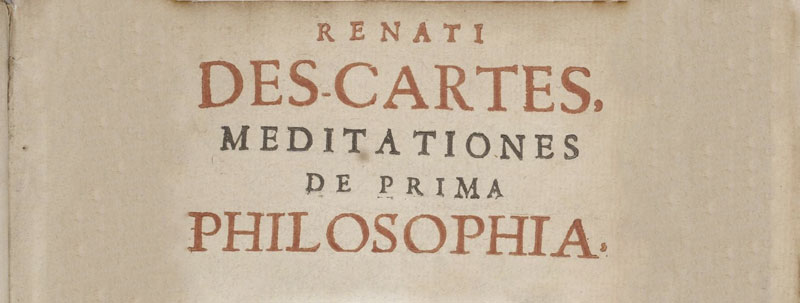
Cover of the original Latin edition of the Meditations
Today we're going to discuss the Meditations on First Philosophy, begun by Descartes in 1639 and published in 1641. Descartes uses the format of a 'Meditation' in the sense of a mental exercise or journey, much like the one you experienced above. It is on 'first philosophy' in that it is concerned with a question that must be answered before any other knowledge can be produced: do I know anything at all?
To do this well, you absolutely must read the Meditations yourself. It is sharp and engaging. Like this course, Descartes proceeds on the idea that philosophy is something you must do and explore yourself, and not something you can memorise. So dive in. Start your own exploration.
Meditation 1: The sceptical method
Shaky foundations
"It is some years now since I realised how many false opinions I had accepted as true from my childhood onwards, and that, whatever I had since built on such shaky foundations, could only be highly doubtful." (Descartes 1641, pg.13)
Descartes begins the first Meditation with this sentence. It recalls of a familiar fact: children often get things wrong. Ask yourself: when you began building up your knowledge of the world, did you have a plan? Of course not: you were just a child. And yet you continued to build what you think you know, much like the builder of a house. Except you're like a house builder without a plan, and with a foundation built by a 3-year-old.

Your childhood thoughts provide a shaky foundation for your current knowledge. Illustration by Eren Dedeleroğlu
How would you expect such a house to fare? Of course it might all come crashing down. There is thus a danger that your beliefs may fare no better. Has this ever happened to you, or to someone you know? The internet is rife with such tales.
The fact is, the system of knowledge that we all began to build as children may well have a shaky foundation. It might not hurt to introduce some systematic doubt into our thinking.
This is how the Meditations begin. Descartes wrote 6 Meditations in all, which he writes as if they occur on 6 consecutive days. We will only be discussing the first two, but they are all worth reading. The aim of the book is ambitious: to establish a secure foundation for all knowledge, replacing our shaky childhood foundation with one that cannot collapse. In the first meditation, Descartes sets out the problem, as well as the method that he will adopt to solve it.
Reasons to doubt
The Problem of Scepticism. Is it possible to know anything at all?
The fundamental problem that the Meditations confronts is the problem of scepticism. As Descartes points out, the problem is made difficult from the fact that even our senses can be deceiving:
"Certainly, up to now whatever I have accepted as fully true I have learned either from or by means of the senses: but I have discovered that they sometimes deceive us, and prudence dictates that we should never fully trust those who have deceived us even once." (Descartes 1641, pg.13)

The chessboard shadow illusion
For example, most people perceive the squares A and B in the chessboard above to be different colours. This is an illusion: they are in fact the same colour, as a slight modification reveals in the same chessboard below. Your eyes can indeed deceive you!
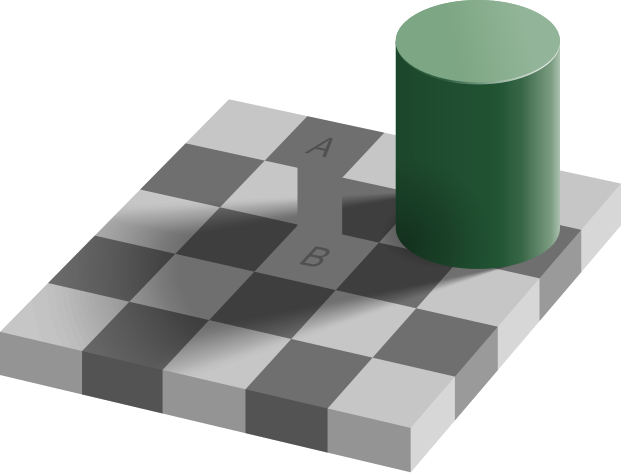
The chessboard shadow illusion, revealed
There are more reasons to doubt, besides the problem of illusions. We mentioned some in our journey at the outset, and you can probably think of a few more yourself. Here are two that Descartes proposes.
Concern 1: The Dream Argument
"I stretch out my hand and feel it knowingly and deliberately; a sleeper would not have these experiences so distinctly. — But have I then forgotten those other occasions on which I have been deceived by similar thoughts in my dreams? When I think this over more carefully I see so clearly that waking can never be distinguished from sleep by any conclusive indications that I am stupefied; and this very stupor comes close to persuading me that I am asleep after all." (Descartes, Meditations pg.18)
Descartes argues that most of the information from his sensory experience, and so most of what we know from science, is undermined by the possibility that we might be dreaming. This is what is sometimes referred to as the Dream Argument. So, we begin by doubting everything that could have been constructed in a dream.
Notably, this does not imply we should doubt everything. For example, suppose that in a dream we see a Griffin.

Wenceslaus Hollar's (17th century) depiction of a Griffin
According to Descartes, the simple parts of this image must come from somewhere: in this case, the body comes from the experience of a lion, and the heads and wings from that of an eagle. He writes: "when painters desire to represent sirens and little satyrs with utterly unfamiliar shapes, they cannot devise altogether new natures for them, but simply combine parts from different animals" (Descartes 1641, pg.14).
As a philosopher, you should always try to understand an argument by reconstructing it in valid premise-conclusion form. The thinking of Descartes here can indeed be reconstructed as a valid argument. Here is one way to do it.
Descartes' Argument About Dreams (reconstructed from pgs.14-15)
- (Premise): A dreamed image is a representation ("resemblance").
- (Premise): If a dreamed image is a representation, then the dream is not an "altogether new" image.
- (Premise): If a dream is not an "altogether new" image, then it represents "real and existing" parts.
- (Conclusion): Therefore, a dream represents "real and existing" parts.
There is an important ambiguity in this argument: what are the parts that Descartes says we know are real? Do arms and legs count? Descartes suggests that they do not. However, he does say that colours count as simple parts, and also abstract angles and numbers of the kind that mathematics like geometry and arithmetic are concerned with. That's convenient: Descartes had just written his masterpiece on Geometry in 1637, and it would be a pity to have to throw it out!
Although the dream problem does not lead Descartes to doubt everything, it does lead him to doubt many things, including physics, astronomy, medicine, and most of the sciences — at least until we can find a way to ensure that it is secure.
Concern 2: The Cartesian Demon
"I will therefore suppose that, not God, who is perfectly good and the source of truth, but some evil spirit, supremely powerful and cunning, has devoted all his efforts to deceiving me." (Descartes 1641, pg.16)
Following Descartes, we are supposed to be in a frame of mind where perceptions like 'I have hands' ares suspect: they might be deceptions. Descartes indeed writes, "eyes, head, hands, and so forth — might be imaginary" (Descartes 1641, pg.15). And yet, he apparently doesn't think that God might be deceiving him about everything. Why? Or worse, why doesn't he even consider doubting the existence of God?

Cristiano Banti, 'Galileo Facing the Roman Inquisition'
A first response is visible in the quote from Descartes above: God is all-good, and thus is would not maliciously deceive us. A second response is that the historical context wouldn't really allow him to doubt this. In 1633, just 4 years before Descartes began the Meditations, the Catholic inquisition had condemned Galileo to house-arrest for his support of heliocentrism, contrary to Church teachings. So, although Hume (writing 100 years later) was able to suggest that a Cartesian sceptic might well doubt the existence of God, this is not something that Descartes would have been able to safely write.
Thus, in place of God, Descartes supposes that there might be an extremely powerful demon or 'evil spirit' deceiving him about the nature of reality. He is not absolutely certain that no such demon exists. As a result, to build his knowledge on a secure foundation, he begins by supposing that such a demon might indeed be deceiving him.
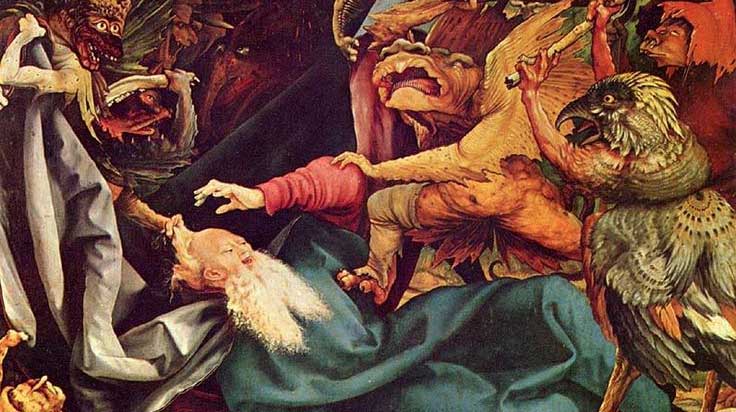
The method: A search for an Archimedean point
At the end of the first meditation, Descartes describes finding himself in the fearful position of extreme doubt. He still believes in God, and in mathematical facts like arithmetic and geometry. But he doubts whether he has hands, not to mention the propositions of physics, biology and medicine.
What is the point of this exercise? I recommend you view it as a search algorithm. Descartes is trying to determine what among his beliefs absolutely cannot be doubted. And so he proceeds to search amongst his beliefs, systematically doubting everything that he can, with the hopes of eventually finding something that he cannot doubt.

Descartes is after not just a list of indubitable facts, but a so-called 'Archimedean point' for knowledge. Archimedes studied the lever mechanism in his work on the equilibrium of planes, and according to Pappus of Alexandria, famously remarked, "Give me a place to stand on, and I will move the Earth". Descartes hopes to find an analogous point on which to ground knowledge.
Such an Archimdean point would have to be impossible to doubt, but also capable of serving as a foundation for further knowledge. This would provide a powerful analytic way to understand the nature of knowledge, analogous to the power of the Archimedean lever. Although he doesn't doubt mathematics or God, Descartes has not yet seen a way to use these as a sufficient foundation. So, it is this project that Descartes takes up in the Second meditation.
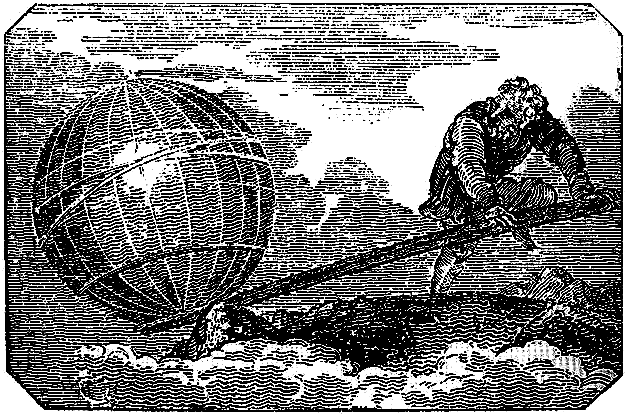
Meditation 2: The Archimedean Point
The 'Cogito' argument
Epistemology: the study of the nature of knowledge, its sources and limits, and its justification.
Philosophers investigate all aspects of epistemology. You can read an overview of the field in the Stanford Encyclopedia of Philosophy entry on epistemology. But one of the most famous expressions in this field, and really perhaps in all of human thought, is due to Descartes:
Cogito Ergo Sum.
I think, therefore I am. This famous statement is the beginning of the foundation or 'Archimedean point' that Descartes hopes to provide for all knowledge. But as a first observation, you may have noticed that Descartes never actually writes these words anywhere in the Meditations. He did write the French, 'je pense, donc je suis', in his earlier (1637) Discourse on Method, and the Latin in his later (1644) Principles of Philosophy. What we actually get in the Meditations is a cluster of arguments, now known collectively as 'the Cogito argument' (or sometimes just 'the Cogito'), that makes use of a related idea.
[T]here is some deceiver or other, supremely powerful and cunning, who is deliberately deceiving me all the time. — Beyond doubt then, I also exist, if he is deceiving me; and he can deceive me all he likes, but he will never bring it about that I should be nothing as long as I think I am something. So that, having weighed all these considerations sufficiently and more than sufficiently, I can finally decide that this proposition, 'I am, I exist', whenever it is uttered by me, or conceived in the mind, is necessarily true. (Descartes 1641, pg.18)
This argument can be reconstructed in the following form.
A Cogito Argument (reconstructed from pg.18)
- I am being deceived.
- If I am being deceived, then I exist.
- I exist.
Note first that this argument has a simple, valid logical form known as modus ponens:
- A
- A implies B
- B
Since the argument is valid, the conclusion is true whenever the premises are. So, are the premises true? That is, is the argument sound? The second premise certainly seems to be true. Indeed, the claim that I do anything at all (experience deception, become convinced, catch a ball, and so on) appears to presume that I exist.
What about the first premise? Here it matters that Descartes has not chosen an experience like 'catching a ball'. The role of 'deception' in particular here is special. There are two possibilities: the first premise is either true or false, i.e. I am either deceived, or I am not. If it is true, and I am deceived, then we are done: since my deception implies I exist, it follows that I exist. But what if the first premise is false, and I am not being deceived? Then my everyday perception that I exist is actually correct, and so the conclusion that 'I exist' again follows.
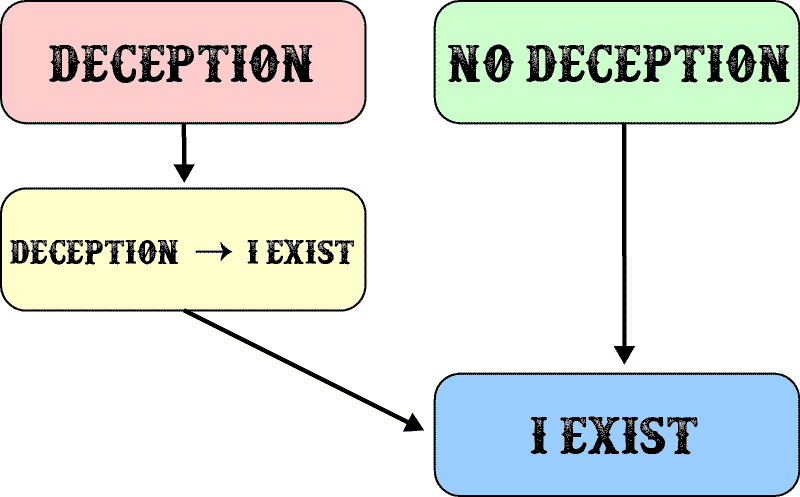
We could replace 'I am being deceived' in the Cogito with a great many activities, and we would still get a valid argument that 'I exist'. But these adjusted arguments would not all have this property, that denying the first premise also implies that 'I exist'. The sceptical method plays a special role in the Cogito argument: If I deny scepticism, then I already believe I exist; if I accept scepticism, then the Cogito implies I exist. Either way, I exist!
An old joke, a thinking thing
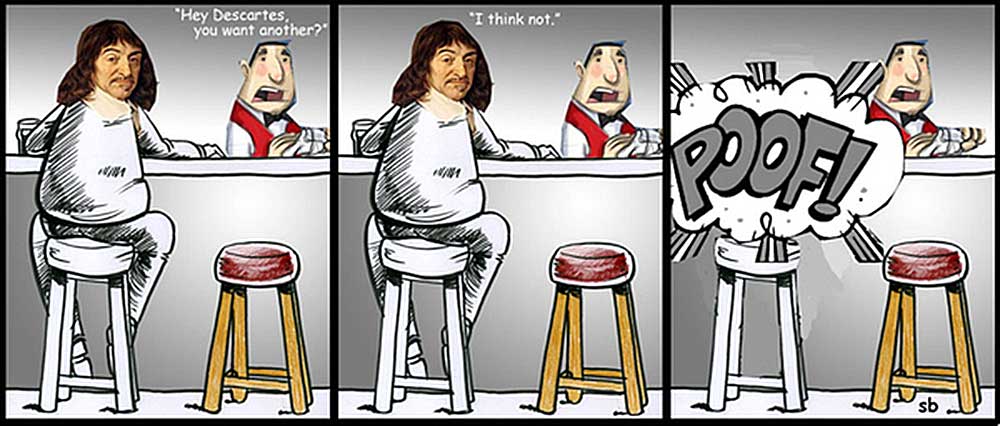
Another version of the Cogito replaces 'am being deceived' with 'think', which gives rise to Descartes' famous statement. In logical form, it says, If I think, then I exist. In contrast, an old philosophy joke presumes that, If I don't think, then I don't exist. Clever students of philosophy and logic are often bothered by this, because these two statements are not the same! In fact, the inference commits a logical fallacy. Given only a statement of the form 'A implies B', the inference that 'not A implies not B' is a fallacy called denying the antecedent (read more about it).
Let me put your philosopher's mind at ease. Now that you are carefully reading the Meditations, you will notice that Descartes says two things. He does indeed suggest that if one thinks, then one exists. But Descartes says the converse as well:
"perhaps if I were to cease from all thinking it might also come to pass that I might immediately cease altogether to exist" (Descartes 1641, pg.19).
So, philosophers and logicians can tell this bad joke too. Descartes said not only "I think therefore I am", but also, "If I didn't think, then I would cease to exist", and so the joke works after all.
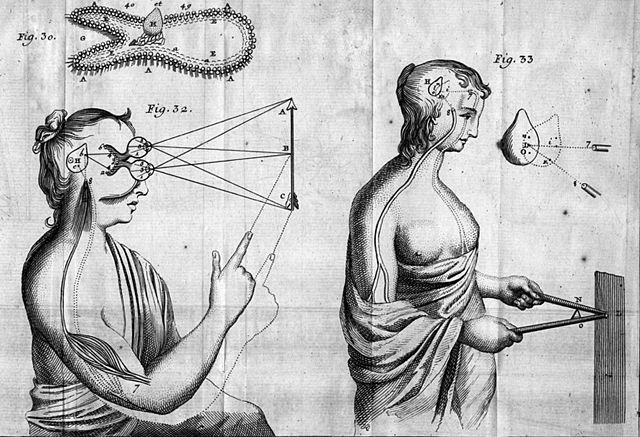
The relevance of the converse to Descartes is that, although the Cogito assures him of some existence, he knows almost nothing about what what kind of thing he is. He doesn't know he is a man, or has a brain or hands, or that his name is Descartes. Instead, he writes only that,
"I am therefore, speaking precisely, only a thinking thing, that is, a mind, or a soul, or an intellect, or a reason.... what kind of thing? I have said it already: one that thinks."
Implications of the Cogito
Descartes hoped to develop a foundation for all knowledge, beginning from a position of radical scepticism. So far he has only established that he exists. He has a long way to go on this journey.
However, as a first example of how he can extend what he knows, he shows how it allows him to understand the nature of perception, by thinking about a ball of wax while operating under the weight of the sceptical method.
Having established that he exists and is thinking, Descartes is free to consider the content of his thoughts. So, he considers a ball of wax that melts in the presence of heat. He notices in particular that it may change size, shape and colour, and thus that his sensory perceptions of the wax may change. However, he says, he still perceives that "the wax remains" — he still perceives the existence of the same wax.

Descartes has not yet given himself reason to believe that wax actually exists outside of his mind. However, from this experiment he does learn that 'understanding in the mind' is more fundamental to perception than sensory experience:
I have now learned that bodies themselves are perceived not, strictly speaking, by the senses or by the imaginative faculty, but by the intellect alone, and that they are not perceived because they are touched or seen, but only because they are understood
Not everyone agrees. The central way to take issue with Descartes' arguments is to attack his premises. Writing 100 years later, the Scottish philosopher David Hume was not impressed, arguing that,
Whatever is may not be. No negation of a fact can involve a contradiction. The non-existence of any being, without exception, is as clear and distinct an idea as its existence. (Hume 1748, pg.143)
One way to understand this is as denying the premise that 'I am deceived', and also the premise that 'I am not deceived' — both sentences would seem to presuppose what Descartes aims to prove, namely that I exist. After all, not all sentences in English need to have a truth value. Think of the sentence, "I have stopped beating my dog." Is it true? — Then why were you beating your dog?? ‐ Or is it not true? — Then stop beating your dog at once!

Statue of David Hume at St. Giles Cathedral in Edinburgh
Hume argues that, if a human were capable of achieving the radical scepticism that the Descartes proposes, this scepticism would be impossible to ever overcome: no argument or perception could convince us otherwise, because we could always just doubt that too. The best we can do, according to Hume, is to say observe "the chief and most confounding objection to excessive scepticism, that no durable good can ever result from it." This would mean that there is pragmatic reason to deny extreme scepticism, but never a truly convincing rational reason.
Margaret Cavendish, writing in 1666, was similarly unimpressed with Descartes' suggestion that a "human mind" is central to the phenomenon of perception in the wax discussion. She argues on the contrary,
"creatures have as much knowledge as man and man as much in his kind, as any other particular creature of its kind; but their knowledge being different, by reason of their different natures and figures, it causes an ignorance of each other's knowledge; nay, the knowledge of other creatures, many times gives information to man: As for example, the Egyptians are informed how high the river Nile will rise by the crocodile's building her nest higher or lower; which shows, that those creatures foresee or foreknow more than man can do" (Cavendish 1666, p.218).

Philosopher and polymath Margaret Cavendish, Duchess of Newcastle-Upon-Tyne
If one takes an animal to be irrational, then it is indeed quite difficult to make sense of the possibility that they have knowledge from a Cartesian perspective. For Descartes, knowledge ultimately arises out of a special process of rational reflection.
Cartesian Epistemology in Science
Descartes is most widely studied by philosophers. However, arguments similar to the Cogito have been given by modern scientists as well, though they were perhaps not aware of the connection. Here is an outline of an argument given by the physicist Brandon Carter in a series of articles (see for example "The anthropic principle and its implications for biological evolution").
An 'Anthropic' Argument
- Humans observe (in particular, we observe that intelligent life is extremely unlikely)
- If humans observe, then humans exist.
- Humans exist.
The similarity to the structure of the Cogito should be clear. Why would a physicist say this? What is the connection between physics and a 17th century philosopher's argument?
There are in general many connections between science and philosophy. In this case, Carter is concerned with a famous calculation, that intelligent life is extremely unlikely to occur in the universe as we understand it. There are many arguments for this. Carter focuses on an argument that most stars will collapse long before life has a chance to evolve, given the typical time scales required for these things.

The Crab Nebula, formed by an ancient stellar collapse
If that calculation is right (and this is far from clear), then it gives rise to a puzzle: how do we explain the development of our own human existence? The answer, according to Carter, is given by an 'anthropic argument': we must posit the existence of human observations no matter what theory we espouse. The existence of such observations is then enough to explain why we exist.
Many find this to be a rather unsatisfying explanation, in that it tries to explain a bio-physical observation without really using any physics or biology. But is it a good argument? The answer depends in part on what you make of the Cogito. Since you are now well on your way to becoming a budding philosopher, I will leave it to you to explore.